
National Administrative Professionals Day is a time to celebrate and recognize the work of administrative professionals who are often the glue that holds the organization together. In honor of Administrative Professionals Day, the Duke Department of Medicine is spotlighting the leaders who oversee key administrative areas of our department.
These administrative leaders represent the backbone of our department in helping us excel in our tripartite mission and thrive at moving medicine forward.
Meet our Administrative Leadership Team

Tell us about yourself!
I am from Eastern North Carolina; my academic journey began with a Bachelor's degree from NC State University, where I developed an interest in human resources and organizational dynamics. Driven by this passion, I pursued further education, attaining a Master's degree in Human Resources from Western Carolina University. In 2011, I started my professional voyage with Duke, where I have dedicated myself to cultivating an inclusive and thriving work environment. Throughout my tenure, I have prioritized nurturing talent and ensuring organizational objectives are achieved. Outside of my career, my heart lies in traveling with my husband and two children.
How would Artificial Intelligence, or AI, explain your role within the DOM?
Human Resources Departmental Director is multifaceted, encompassing strategic leadership, organizational development, and employee relations. As a director, one is responsible for overseeing all aspects of the HR department, ensuring alignment with the organization's goals and objectives. This role involves developing and implementing HR strategies, policies, and procedures to support the overall mission and vision of the organization.
What brings you joy in being a DOM administrative leader?
I enjoy contributing to the Department of Medicine's tripartite mission from an HR perspective. I am dedicated to expanding the capabilities of my HR team and leveraging technology and data to facilitate informed decisions.

Tell us about yourself!
I have worked at Duke University for 23 years, 14 in the DOM, mostly in finance-related roles or clinical operations. I was born and raised in Brooklyn, NY, and I graduated with a degree in Accounting from Pace University in New York City. The Triangle has been my home for 30 years. When I am not working at Duke, I have enjoyed coaching youth sports, serving as finance director at my church and two small local private schools and taking my family on adventure vacations into the Grand Canyon or a jungle in Central America.
How would Artificial Intelligence, or AI, explain your role within the DOM?
I don’t know how AI would describe my role but I know AI cannot describe how I feel about my role. It is always rewarding and even heart-warming to do what I do while working with so many remarkable people. Duke does great things, and big or small, every role here plays a part in helping Duke do the many great things it does. Duke helps people; that is why I work here.
What brings you joy in being a DOM administrative leader?
I very much enjoy being part of the leadership team in DOM because the team brings an enthusiasm and dedication to the mission that I believe is unmatched at Duke. I further appreciate my role because I get to mentor, coach, and lead the next generation of administrators who are coming of age behind me. It is a bit humbling to be allowed to do that. Go Duke!
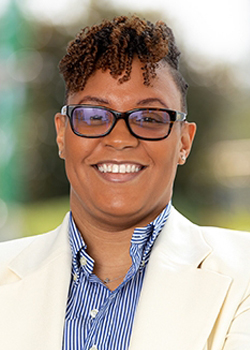
Tell us about yourself!
With more than 24 years immersed in Research Administration, I have navigated through academia, healthcare, and clinical research landscape at Winston-Salem State University, North Carolina Central University, North Carolina State University, FHI360, and Duke University. I earned dual Bachelor's degrees in Business Administration (Accounting) and Computer Information Systems from North Carolina Central University. I then pursued my Master's in Business Administration at Pfeiffer University and completed my academic journey with a doctoral degree in Business Administration from the University of North Carolina – Charlotte. I began my tenure at Duke University in 2009, where I remained until 2014. I later rejoined the institution in 2021 and began working in the Department of Medicine in July 2022. In my current role, I lead a team of over 40 individuals responsible for managing sponsored research funds exceeding $250 million.
How would Artificial Intelligence, or AI, explain your role within the DOM?
Artificial Intelligence would describe my role as a senior-level position overseeing administrative aspects of research projects. This includes managing proposal development, grant oversight, regulatory compliance, budgeting, and reporting.
What brings you joy in being a DOM administrative leader?
I find fulfillment in mentoring and guiding a team through the entire lifecycle of research administration, ensuring success from inception to closeout.
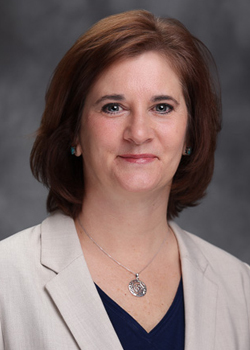
Tell us about yourself!
I was born in Belfast, Ireland, and then lived just outside of Vancouver, British Columbia, Canada. Though the Pacific Northwest has a place in my heart, I love living in North Carolina between the mountains and beaches. I love backpacking and my son and I will hike the West Coast Trail in July.
I am a nurse, and I have practiced as a nurse practitioner in a cardiology clinic for 10 years. During this time, I was asked to build a research program and have been working at Duke in a research role for 15 years.
How would Artificial Intelligence, or AI, explain your role within the DOM?
As Director of Clinical Research Administration, I oversee and coordinate activities of research operations and finance professionals within the Medicine clinical research unit. We are responsible for protecting the rights of research participants and supporting our faculty so that we perform research activities in adherence to Duke, local and federal policies and procedures.
What brings you joy in being a DOM administrative leader?
My biggest joy in working in the DOM is collaborating with key stakeholders inside and outside of Duke so our faculty and research teams can bring research opportunities to our patients and community. I am grateful to be a part of this fantastic team at Duke.

Tell us about yourself!
After I earned a Finance degree from the University of Arizona in Tucson, I started at Duke in 2001 for temporary services. While working on a special project for the PDC/PRMO dissolution, I met John Robinette, who provided me with an opportunity that launched my career at Duke. He introduced me to Cathy Thompson in PDC and she hired me for a Financial Analyst position. After I worked 4 years at the PDC, Janet Reagan hired me in the Department of Medicine as an Administrative Manager. I worked in that role for 17 years, and when Janet retired, I became Finance Director. I would not be where I am today without the support of these people and many more.
My experiences at Duke have taught me that people are Duke’s most valuable resource. My team and I work hard every day, but I am also a big advocate for work-life balance to stay happy and productive. Outside of work, I enjoy solo backpacking, hiking, camping, mountain biking, and canoeing with my wife and 14-year-old daughter.
How would Artificial Intelligence, or AI, explain your role within the DOM?
As Finance Director for the Department of Medicine, I work with other department leaders and staff on Financial Management and Oversight, Fiscal and Internal Control Management, Budget Development, Monitoring and Financial Reporting, and Analysis and Business Intelligence. The Finance Team and I strive to support our faculty and staff by providing value-driven and data-informed analysis and information.
What brings you joy in being a DOM administrative leader?
The Duke Department of Medicine strives for excellence and equity by providing compassionate health care for all individuals, creating an inclusive environment to train the next generation of health care providers and leaders, and driving new knowledge to improve the health of our population locally and globally across the three missions of Patient Care, Education and Research. Knowing that every day coming into work, our faculty are saving people's lives through Patient Care, Research, and Education and that fact we are making the world a better place is what brings me joy being an Administrative Leader within the Department.
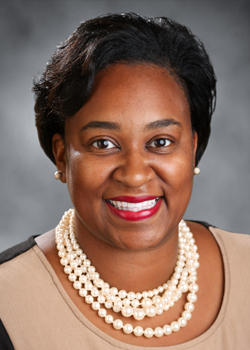
Tell us about yourself!
I was born and raised in Washington, DC and moved to North Carolina in the late 90s. I grew up watching the local news with my maternal grandfather and it sparked an interest in broadcast journalism. After my grandfather passed away, I decided to go back to school to obtain my bachelor’s degree. Initially, I was a journalism major. However, after learning about the often, difficult road of broadcast journalism, I decided to major in Public Relations at North Carolina Agricultural & Technical State University (NC A&T). As a non-traditional student, I worked full-time as a third-shift Patient Access Supervisor in a Level III Trauma Center, while I attended classes during the day. After graduation, I began working as a Communications Specialist for the local hospital. Since arriving at Duke in 2015, I have grown in my administrative role from a public relations specialist to a director of communications, and I have earned a master’s degree in corporate communications from Purdue University. When I’m not leading communications efforts with DOM, I enjoy being a wife, mom of a NICU survivor, and bonus mom to two young adults. Additionally, I recently became an online Transformation Coach with Herbalife Nutrition.
How would Artificial Intelligence, or AI, explain your role within the DOM?
Overall, the Director of Communications plays a critical role in shaping how the DOM is perceived by its various stakeholders and in ensuring that its messages are clear, consistent, and aligned with its goals and values.
What brings you joy in being a DOM administrative leader?
The world of health care is filled with so many mixed perceptions. These perceptions are often a result of what an individual has experienced themselves or watched others experience. As the largest department within the School of Medicine, the work of our faculty, staff and trainees is a significant contribution to Duke improving the health of our communities at large. I genuinely enjoy being able to raise awareness of what the DOM is doing across our department that can shift an individual’s perspective on medicine. I also enjoy the collaborative environment within our department that encourages team work.

Tell us about yourself!
I grew up in Massachusetts, where I received my bachelor’s degree in accounting from Stonehill College. I became a CPA working at a large Public Accounting Firm specializing in mid-size start-up companies and tax accounting. Ten years later, I pursued a career in Higher Education, working at two different colleges responsible for their finances and business administration offices. These roles led to an exceptional opportunity at Duke to serve as the Associate Dean of Finance for the School of Medicine, which allowed me to learn and grow as an Administrator. I quickly gained a strong understanding of the financial fund's flow & business practices, specifically the dynamics of the tripartite missions. After more than 12 years with the Dean’s Office, I joined the Department of Medicine as the Associate Vice Chair for Finance and Administration and am finishing my 5th year. I enjoy working with our Leadership Team, overseeing our departmental resources, and supporting our faculty and staff as we navigate through complex times at Duke Health.
How would Artificial Intelligence, or AI, explain your role within the DOM?
AI might say my role is to be a resource who understands how to navigate the pathways at Duke from a fiscal and financial perspective on business processes and policy statements. Perhaps more specifically, I have an in-depth understanding of financial funds flow across the Institution (SOM, DHIP, and DUHS) and can navigate issues on behalf of the Department with the School of Medicine and DUHS Leadership groups.
What brings you joy in being a DOM administrative leader?
As an Administrator, we are called upon each day to find solutions to complex issues or asked to guide our department leaders in navigating difficult situations. There is not a day that is the same at Duke, especially this past year, where we, as Administrators, “together,” have worked hard to adapt to new ways of supporting our faculty and each other. The collegiality of our administrative team members brings me joy, knowing we are helping one another through a massive change for our Department and Duke Health.
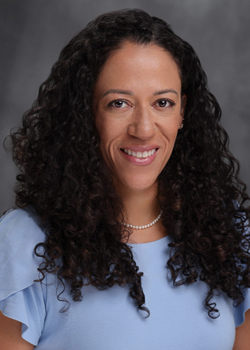
Tell us about yourself!
I was born in New York, have relatives in Massachusetts, and spent my formative years in Sanford, NC. I pursued my undergraduate studies at NC State and completed my graduate studies at Clark Atlanta University. My journey with Duke began in 2012 within Nursing Services, though I stepped away from Duke for a few years before returning to join the GI team approximately five years ago. Throughout my tenure with GI, I've held various roles within the division, starting as a strategic services associate and eventually taking on the responsibility of overseeing the staff assistant team during the challenges posed by COVID-19. During this time, my then-supervisor was offered an opportunity outside our division, leading me to step into her role of clinical administrator. Following several years in this position, I was promoted to Division Administrator, a role I've proudly held for approximately a year now. Prior to my time with Duke GI, I gained experience in the marketing field, where I split my time between Durham and DC, managing office operations for a small marketing firm.
How would Artificial Intelligence, or AI, explain your role within the DOM?
The role of a division administrator within the Duke Gastroenterology (GI) Division of the Department of Medicine typically involves overseeing the division's administrative operations. This role is key to ensuring the smooth and effective functioning of the division's activities, both clinical and research-focused. Here are some general responsibilities that might be included in this role:
1. Financial Management: Managing the division’s budget, overseeing financial planning, and ensuring cost efficiency. This might also involve preparing financial reports and managing grants.
2. Operations Management: Ensuring that the day-to-day operations of the division are running smoothly. This could include overseeing staff, managing schedules, and ensuring compliance with hospital and department policies.
3. Strategic Planning: Assisting in the development and implementation of long-term strategies to promote the growth and improvement of the division. This might include program development, expansion of services, or integration of new technologies and practices.
4. Human Resources: Overseeing the recruitment, training, and development of division staff. This includes managing personnel issues and fostering a positive work environment.
5. Compliance and Quality Assurance: Ensuring that the division complies with all regulatory and accreditation requirements. This may also involve overseeing quality improvement initiatives.
6. Liaison Roles: Liaison between the division and other departments within the hospital, external agencies, and other stakeholders.
7. Support for Research and Clinical Trials: Supporting the research initiatives of the division, which may include managing the administration of clinical trials, facilitating collaborations, and ensuring compliance with research protocols.
The specific duties can vary depending on the division's particular needs and the institution's organizational structure. In a prestigious and research-intensive institution like Duke, the role may also emphasize supporting cutting-edge research and maintaining high standards of clinical care.
What brings you joy in being a DOM administrative leader?
As a DOM administrative leader, what I find most rewarding is the ability to make a significant impact on both patient care and the working environment for our staff and faculty. I truly enjoy leading strategic initiatives that improve our services and enhance the quality of care, seeing visions come to fruition, and knowing that these efforts make a real difference in people’s lives. Additionally, developing and mentoring my team, fostering a supportive and innovative culture, and navigating the challenges together strengthen our collective purpose and commitment. This role allows me to contribute meaningfully to our missions, and witnessing the personal and professional growth of our team members is truly gratifying.
Furthermore, supporting our faculty is equally fulfilling. Facilitating their success in both clinical and research endeavors is incredibly rewarding. By providing the necessary resources and fostering a collaborative atmosphere, we aim to support our faculty to excel in their respective fields and, consequently, to provide exceptional care and innovative solutions. Seeing them achieve their professional goals and contribute to groundbreaking work not only elevates our division but also reinforces the importance of our administrative roles in cultivating an environment where academic and clinical excellence can thrive.
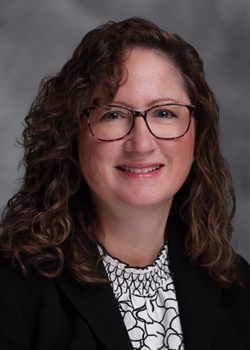
Tell us about yourself!
I was born and raised in Salem, MA, and moved to North Carolina in 2007; I currently reside in Raleigh. I have two children that I am extremely proud of. Now that they are grown and thanks to our benefits at Duke, I am able to spend my time off traveling with friends, family or solo. I have been with Duke Endocrinology for just over 10 years.
How would Artificial Intelligence, or AI, explain your role within the DOM?
Overseeing the daily operations of the division to run efficiently and smoothly while balancing the divisional needs under the guidelines of the department.
What brings you joy in being a DOM administrative leader?
Mentoring and developing my administrative staff and APP’s to flourish in their careers as well as creating solutions to the business challenges that are presented within the division.
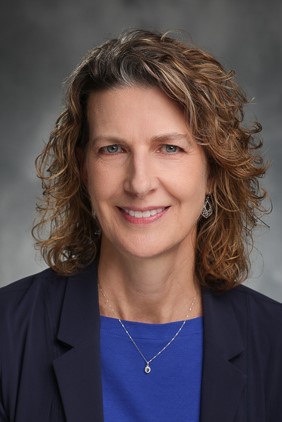
Tell us about yourself!
I’m originally from the Washington DC area, growing up as a military brat primarily on Andrews Air Force Base. I graduated from Duke University with a bachelor’s degree in psychology and from the University of Michigan in Ann Arbor with a Master’s in Health Services Administration. After graduating from Michigan, I moved to Chicago for an Administrative Fellowship at the University of Chicago Hospitals. I met my husband, Brad, while volunteering at the National Runaway Switchboard in Chicago. I continued working at the University of Chicago in administrative roles in oncology and ambulatory medicine while Brad worked on his master’s degree in elementary education. Once he graduated, we moved to NC to be closer to family. I started working at Duke in the fall of 1993 in Cardiology. I took a detour to the Department of Ob/Gyn for about 5 years and then came home to the Department of Medicine in 2007. I have been in the Division of Pulmonary, Allergy and Critical Care ever since. Brad and I have been married for 31 years, and we have 2 sons, Spencer and Graham. Thankfully, they are all Duke fans!
How would Artificial Intelligence, or AI, explain your role within the DOM?
As an administrator of pulmonary, allergy, and critical care, this role involves overseeing the efficient operation and management of the healthcare services provided within these specialized areas. Here's a detailed description of what the job might entail:
1. Strategic Planning: This person is responsible for developing long-term strategic plans for the department, aligning them with the healthcare facility's overall goals and objectives. This includes identifying opportunities for growth, improving patient outcomes, and enhancing the quality of care.
2. Financial Management: Oversees the department's budget, ensuring that resources are allocated effectively to meet operational needs while maintaining fiscal responsibility. This might involve budget planning, monitoring expenses, and identifying cost-saving measures where possible.
3. Personnel Management: This position leads and manages a team of healthcare professionals, including physicians, nurses, technicians, and administrative staff. It involves recruitment, training, performance evaluation, and fostering a positive work environment to promote staff satisfaction and retention.
4. Quality Assurance and Compliance: A key aspect of the role is ensuring that the department complies with regulatory requirements and maintains high standards of quality and safety in patient care. It establishes and implements policies, procedures, and quality improvement initiatives to achieve and maintain compliance with accreditation standards and regulatory guidelines.
5. Operational Oversight: Responsible for the department's day-to-day operations, ensuring that services are delivered efficiently and effectively. This includes managing patient flow, scheduling appointments and procedures, optimizing resource utilization, and addressing any operational issues that may arise.
6. Patient Care Coordination: Oversee the coordination of patient care within the department, ensuring seamless transitions between different levels of care and healthcare providers. This involves collaborating with other departments and specialties to provide comprehensive and integrated care to patients with complex medical needs.
7. Community Engagement and Outreach: Represent the department within the community and establish partnerships with other healthcare providers, community organizations, and patient advocacy groups. This includes organizing health education programs, participating in community events, and promoting awareness of pulmonary, allergy, and critical care issues.
8. Technology and Innovation: Stay abreast of advancements in healthcare technology and identify opportunities to leverage technology to improve patient care, streamline operations, and enhance efficiency. This might involve implementing electronic health record systems, telemedicine services, or other digital health solutions.
9. Emergency Preparedness: Develop and implement emergency preparedness plans to ensure the department is equipped to respond effectively to emergencies and disasters, such as pandemics, natural disasters, or mass casualty events. This includes conducting drills, training staff, and coordinating with other departments and external agencies.
Overall, the role of the administrator of pulmonary, allergy, and critical care is multifaceted and requires strong leadership, management, and communication skills to ensure the delivery of high-quality healthcare services and the efficient operation of the department.
What brings you joy in being a DOM administrative leader?
I love being around so many intelligent, hardworking people. Each day brings new challenges, and it’s never boring! I have worked with many different specialties in my career, and I can confidently say that Medicine physicians are my favorite. My goal is to support everyone in my division, helping them to do their jobs better and advance the care provided to patients.